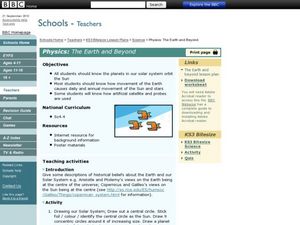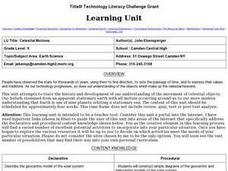Laboratory for Atmospheric and Space Physics
Space Travel Guide
Looking to take a trip? Why not go to space? Here, scholars take on the role as travel agent to create a guide to their favorite planet including travel tips and sightseeing recommendations.
Teach Engineering
Manned Mission to Mars
To go or to not to go — the question for a mission to Mars. This resource provides details for a possible manned mission to Mars. Details include a launch schedule, what life would be like on the surface, and how the astronauts would...
Curated OER
Inner Planets
Middle schoolers research characteristics of the planets and record their findings on Planet Web worksheet. They create fold paper to create a foldable booklet to display the information they discover about the planets.
Curated OER
The Discovery of the Solar System
Students explain the observed motion of the planets. The inner ones move back-and-forth across the position of the Sun, while the outer ones usually advance in one direction, but with occasional temporary reversals known as "retrograde...
Curated OER
Try This On For Size!
Students view a video to gather information about our solar system. They create models of the planets to scale and place them in scale relative to their distances from the sun. They also visit a planetarium or use the internet to gather...
Curated OER
Physics The Earth and Beyond
Fourth graders will explore our solar system. In this physics lesson students create a model of the solar system to explore the movement of Earth, the Sun, and stars.
Curated OER
Celestial Motions
Ninth graders complete a unit of lessons on the history of our knowledge of celestial objects. They conduct Internet research, plot the motion of a planet, construct a model of the sun's apparent motions, and create diagrams of the solar...
Curated OER
Interplanetary Distance and Travel Time
Students are introduced to the challenges involved in understanding the space travel distances and the time involved to do so through the use of an interactive fable. The modeling and comparisons deal with specific distances at different...
Scholastic
Lesson One: The Earth, Background and Glossary
How much do you really know about our planet? Middle schoolers build up their prior knowledge about Earth, its placement in the solar system, its composition, and important geological vocabulary with an introductory earth science lesson.
Laboratory for Atmospheric and Space Physics
Where Are We Going?
Come take a ride on the space bus! Scholars go on an imaginary trip to pick up their peers from the inner and outer planets while reinforcing math skills. First, learners round decimals to identify each planets' distance from Earth....
Curated OER
What's "Out" There?
First graders investigate the five outer planets. In this space science lesson plan, 1st graders read the book Our Solar System and identify the five outer planets. Students create a booklet and write about outer planets.
Curated OER
Our Solar System to Scale
Students calculate the diameter of planets and their relative distances. In this space science lesson, students discover how small or big the planets are in comparison to each other. Students use cross multiplying fractions to find...
Curated OER
The Discovery of the Solar System
High schoolers study the ideas behind the heliocentric theory of Copernicus. They examine about retrograde motion of the planets as they move around the sun. They study astronomers who include Ptolemy, Copernicus, and Galileo.
Curated OER
Being Nosy About Our Neighbors
Students use the scientific method to explore the effect of size on impact cratering. They compare images of landforms on Earth to those of other planets to compare surface processes. Students infer the geologic history of another...
Curated OER
Glowing Glimpses of Our Universe
Students will complete hands-on space activities. In this space science instructional activity, students will create a glow-in-the-dark model of the solar system, visit a planetarium, make star pictures, and paint constellations....
Curated OER
Solar System: Earth
Young scholars research Earth including what makes it suitable for life, its rotation, geological composition and gravity.
Laboratory for Atmospheric and Space Physics
Charting the Progress of New Horizons
In 2006, New Horizons began its mission to fly to Pluto. As it continues its journey, scholars track its progress with the help of an informative website, all the while reinforcing measurement concepts with the construction of a scaled...
NASA
Let's Investigate Mars
Take your science class on a hypothetical field trip to Mars with an engaging astronomy lesson. After first learning about NASA's Mars rover missions, young scientists plan their own scientific investigations of Earth's...
Laboratory for Atmospheric and Space Physics
Looking to the Future
New Horizons set forth on a mission to Pluto in 2006. Ten years later, the spacecraft is still on its way. Here, enthusiastic scholars predict what they will be like—likes, dislikes, hobbies, etc.—when New Horizons arrives at its...
Laboratory for Atmospheric and Space Physics
Growing Up With A Mission
New Horizons began its journey to Pluto in 2006. Ten years later, it continues its mission. In that time, scholars have surely grown, but how much more will they grow by the time New Horizons reaches its destination? Find out with an...
Curated OER
Astronomy Teamwork
Middle schoolers work together in groups to complete an astronomy project. In the classroom, they find real objects to represent various objects in the solar system. After going outside, they practice using a distance scale and use...
Curated OER
Meteorites
Students model how meteors fall to the surface of planets. In this space science lesson, students identify different types of meteorites using an interactive online website. They investigate the relationship between a meteorite's size...
Curated OER
Comet Myths, Facts, and Legends
Here is an interactive book lesson through which learners explore the facts and stories about comets. The plan is comprehensive, providing background information, standards met, vocabulary, assessment ideas, and more. Though the content...
Messenger Education
Give Me a Boost—How Gravity Assists Aid Space Exploration
The propellant needed for space explorations runs in the thousands, while paying to get the craft into orbit costs millions! In the second installment of three, two activities explore laws of conservation of energy and momentum. Using...

























